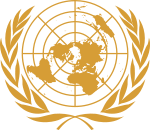Chapter I of the United Nations Charter
- Chapter I of the United Nations Charter
-
Chapter I of the United Nations Charter lays out the purposes and principles of the United Nations organization. These principles include the equality and self-determination of nations and the obligation of member countries to obey the Charter, to cooperate with the UN Security Council and to use peaceful means to resolve conflicts. These "purposes and principles" reflect a premise that the effectiveness of the United Nations would be enhanced with broad guidelines to guide the actions of its Organisations and member states. However, some member were concerned that these proposals granted what they considered overly broad discretionary powers for the organs of the United Nations in the Dumbarton Oaks Conference proposals. And the adopted purposes and principles have been seen as reflecting the compromise achieved.[1]
Article 1: Purposes of the United Nations
The adopted purposes of the United Nations reflect a premise that the effective The Dumbarton Oaks proposals Article 2, clauses 3-4 essentially prohibit war (except in self-defense) by stating, "All Members shall settle their international disputes by peaceful means in such a manner that international peace and security, and justice, are not endangered. All Members shall refrain in their international relations from the threat or use of force against the territorial integrity or political independence of any state, or in any other manner inconsistent with the Purposes of the United Nations." (The right to self-defense is reaffirmed in Article 51, which states, "Nothing in the present Charter shall impair the inherent right of individual or collective self-defense if an armed attack occurs against a Member of the United Nations . . ."
Article 2, clause 7 of this chapter reemphasizes the fact that only the UN Security Council has the power to force any country to do anything by stating that "Nothing contained in the present Charter shall authorize the United Nations to intervene in matters which are essentially within the domestic jurisdiction of any state or shall require the Members to submit such matters to settlement under the present Charter; but this principle shall not prejudice the application of enforcement measures under Chapter VII." (Only the Security Council can institute Chapter VII enforcement measures.)
References
- ^ Wolfrum, Prof.Dr.Rudiger (1994), Simma, Bruno, ed., The Charter of the United Nations, A Commentary, New York: Oxford University Press, pp. 49, ISBN 9780199244492
Categories:
- Divisions and sections of the United Nations Charter
- United Nations documents
Wikimedia Foundation.
2010.
Look at other dictionaries:
Chapter VII of the United Nations Charter — sets out the UN Security Council s powers to maintain peace. It allows the Council to determine the existence of any threat to the peace, breach of the peace, or act of aggression and to take military and nonmilitary action to restore… … Wikipedia
Chapter IV of the United Nations Charter — contains the Charter s provisions dealing with the UN General Assembly, specifically its composition, functions, powers, voting, and procedures. Contents 1 Primacy of the General Assembly 2 Articles 10, 11, 12, 13, 14, 15, and 16 3 Article 17 … Wikipedia
Chapter VI of the United Nations Charter — deals with peaceful settlement of disputes. It requires countries with disputes that could lead to war to first of all try to seek solutions through peaceful methods such as negotiation, enquiry, mediation, conciliation, arbitration, judicial… … Wikipedia
Chapter II of the United Nations Charter — deals with membership of the United Nations organization. Membership is open to the original signatories and all other peace loving states which accept the obligations contained in the present Charter and, in the judgment of the Organization, are … Wikipedia
Chapter III of the United Nations Charter — summarizes the principal organs of the United Nations. They are listed in the same order as the chapters detailing their composition, functions, and powers appear in the Charter. The placement of the General Assembly first in the list probably is … Wikipedia
Chapter IX of the United Nations Charter — deals with international economic and social cooperation. Article 55 reflects the philosophy of the UN that efforts should be made to impact the root causes of war: With a view to the creation of conditions of stability and well being which are… … Wikipedia
Chapter XVI of the United Nations Charter — contains miscellaneous provisions prohibiting secret treaties, establishing the UN Charter as supreme over any other treaties, and providing for privileges and immunities of UN officials and representatives. Contents 1 Article 102 2 Article 103 3 … Wikipedia
Chapter V of the United Nations Charter — contains provisions establishing the United Nations Security Council. Article 23 establishes the composition of the Security Council, with five permanent members (the Republic of China, France, the Soviet Union, the United Kingdom, and the United … Wikipedia
Chapter VIII of the United Nations Charter — deals with regional arrangements. It authorizes regional organizations (such as NATO) and even requires attempts to resolve disputes through such agencies (if available) prior to intervention by the UN Security Council. However, Article 53… … Wikipedia
Chapter XV of the United Nations Charter — deals with the UN Secretariat. It designates the UN Secretary General as the chief administrative officer of the organization, which includes the staff of ECOSOC, the Trusteeship Council, and other organs. Similarly to how the US Constitution… … Wikipedia

